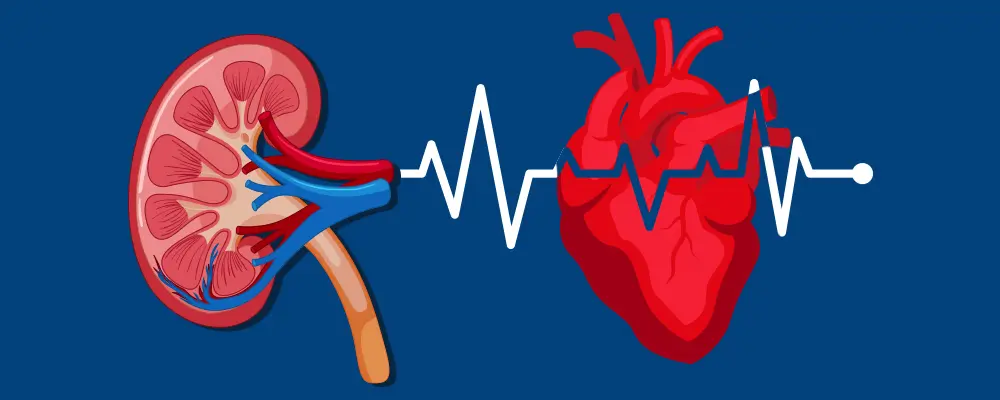In the human body, each organ plays a vital role in an intricate system, with the heart and kidneys especially dependent on each other. A common question is, “Can kidney failure cause heart failure?” When impairment occurs in one organ, it often leads to dysfunction in the other. Kidney failure can potentially cause heart failure, demonstrating the interlinked nature of these conditions. Continue reading to explore how kidney failure can cause heart failure, how this relationship affects health, and how impairment in one organ can lead to dysfunction in another.
Introduction
When one organ experiences dysfunction, it often leads to dysfunction in the other organ as well as in the case of kidney and heart. Kidney disease and heart failure have complex and crucial interactions. In this blog we discuss the correlation between these two serious medical conditions, focusing on can kidney failure cause heart failure.
Roles of the Kidney and Heart
- Kidneys: These incredible bean shaped organs remove and filter waste products and excess fluid from blood. They aid in the production of RBCs (red blood cells), regulate blood pressure, and maintain healthy bones.
- Heart: With every beat of the heart, oxygenated blood is circulated throughout the body, ensuring that each cell, organ and tissue receives the oxygen and nutrients it needs. The heart is an essential organ for blood transportation throughout the body.
Kidney Failure: The Silent Killer or Is It?
Kidneys are bean-shaped organs, responsible for performing many distinct functions:
- Filtration: They filter and remove excess fluids and waste products from blood.
- Regulation of Blood Pressure: Kidneys contribute to maintaining blood pressure within optimal range.
- Red Blood Cell Formation: Kidneys are involved in producing red blood cells.
- Bone Health: Kidneys help to maintain healthy bones by regulating calcium and phosphorus levels.
The effects of dysfunction of kidneys radiate all over the body, especially on the heart. When function of kidneys declines gradually over a minimum period of 3 months, it is known as chronic kidney disease (CKD). As CKD progresses, it can lead to kidney failure, where the kidneys are unable to perform their function effectively.
Heart Failure: The Weakened Controller
Heart failure, on the contrary, does not indicate that the heart stops beating. However, it reflects a weakening of the ability of the heart to pump blood adequately. Heart failure is caused by several factors:
- High Blood Pressure: The heart muscle is strained by prolonged high blood pressure.
- Arrhythmias: Inadequate cardiac rhythms impair the efficiency of the heart’s muscles.
- Heart Valve Disease: Flow of blood is disrupted by malfunctioning or damaged heart valves.
- Heart Attacks: The ability of the heart to pump blood is impaired when cardiac muscle is damaged.
Can kidney failure cause heart failure?
The answer to the question, “can kidney failure cause heart failure?” is, yes.
The Two-Way Relationship
Lets understand reason behind the question “Can Kidney failure cause heart failure”:
- Kidney Disease (CKD): CKD is a gradual loss of kidney function over at least 3 months. It impairs the kidney’s ability to regulate blood pressure, balance fluids, filter waste, and produce red blood cells. CKD can contribute to heart failure.
- Heart Failure (HF): HF occurs when the heart struggles to pump blood effectively.
It can result from various conditions, including heart valve disease, arrhythmias, high blood pressure, or damaged heart muscle after a heart attack. HF does not mean the heart stops beating; rather, its pumping ability weakens. - The Connection: Kidney failure causes heart failure by the development of risks. Reduced oxygenated blood nourishing the kidneys can disrupt their function. Conversely, inefficiently filtered blood can strain the heart, weakening its pumping ability over time. A 2021 study indicate that can kidney failure cause heart failure, people with stage 4 and 5 CKD face an increased risk of heart failure.
How Can Kidney Failure Cause Heart Failure?
Following is the cascade of can kidney failure cause heart failure through several mechanisms:
- Fluid Overload: When kidneys are unable to filter out excess fluid, this can lead to fluid retention, increasing the volume of blood that the heart must pump. This additional workload can put a strain on the heart, potentially leading to heart failure.
- Hypertension: Damaged kidneys may produce hormones that cause blood vessels to narrow, leading to high blood pressure. This hypertension forces the heart to work harder to pump blood, which can weaken the heart over time and contribute to heart failure.
- Atherosclerosis: Kidney disease can lead to a buildup of waste products in the blood, which can contribute to the hardening and narrowing of arteries (atherosclerosis). This condition makes it more difficult for the heart to pump blood, increasing the risk of heart failure.
- Anemia: The kidneys also play a role in producing erythropoietin, a hormone that stimulates the production of red blood cells. In kidney failure, reduced erythropoietin levels can lead to anemia, which means less oxygen is carried to the heart, potentially leading to heart failure.
Treatment Approach: Can Kidney Failure Cause Heart Failure
Let’s explore treatment approach against the question of Can Kidney Failure Cause Heart Failure
- Blood Glucose and Blood Pressure Management: Controlling hypertension and diabetes is crucial. These conditions are shared risk factors for both HF and CKD.
- Monitoring: Regular blood tests, echocardiograms, and other imaging help diagnose and monitor HF and CKD.
- Diuretics: These medications reduce fluid retention, alleviating symptoms. HF often causes the body to retain excess fluid.
- Lifestyle Changes: Exercise, diet, and adherence to prescribed medications are vital.
- Medications: Sodium glucose cotransporter antagonist, beta blockers, mineralocorticoid receptor inhibitor, and angiotensin converting enzyme inhibitors, play important roles in controlling and treatment of HF.
Conclusion
The correlation between heart failure and kidney disease is a reminder of the delicate balance within our bodies. Understanding this relationship is crucial for the early detection and management of both conditions. By recognizing the signs and symptoms early on, and with proper medical intervention, individuals can manage these conditions more effectively, leading to better health outcomes.




